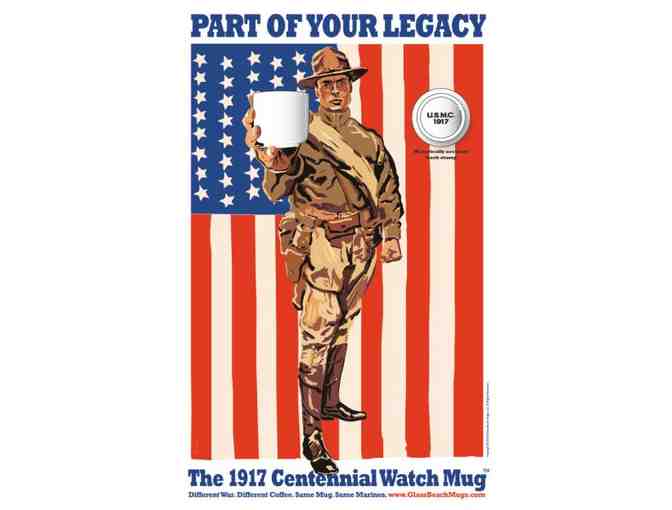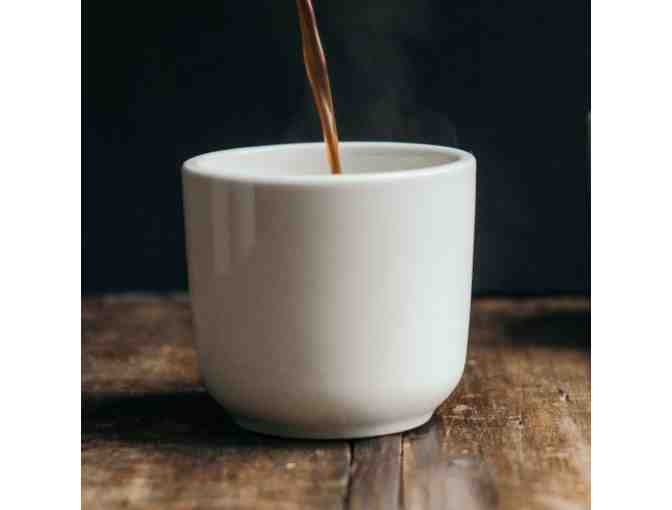U.S. Veteran Made
A Veteran Owned Business: Glass Beach Coffee Mugs
- Item Number
- 119
- Estimated Value
- 70 USD
- Sold
- 70 USD to vh062d6ab
- Number of Bids
- 8 - Bid History
Item Description
We are proud to offer two 1917 Centennial Watch Mugs from the Glass Beach Coffee Mug Company, a Veteran Owned Business! These unique mugs are the perfect gift for the veteran, history buff or coffee-lover in your life! Read below for more info from the Glass Beach Mugs website!
What Is a Centennial Watch Mug?
1917 Centennial Watch Mug™ is based on dated fragments of original Marine Corps enlisted mess hall china recovered from a dump site in Guantanamo Bay, Cuba. Like the original mugs, the handleless mug (known in the military as a “watch mug”) is built for durability.
Where Are They Made?
This authentic replica is made in Newell, West Virginia, by the Homer Laughlin China Company.
Glass Beach Mugs' Charitable Support
Glass Beach Mugs donates a portion of all proceeds to support Marines and their families via Marine Corps Community Services.
More About The 1917 Centennial Watch Mug
High-fired porcelain
Measures 4” (rim diameter) x 3.5”
Weighs 1 lb. 4 oz.
Holds 13 fl. oz.
Lead-free
Oven, microwave and dishwasher safe
Replica date stamp on bottom is covered by clear glaze and will never fade
Licensed by the U.S. Marine Corps Trademark Licensing Office, as indicated by a removable hologram sticker
No Handle, No Problem
Some modern coffee drinkers may be concerned about the absence of a handle. Like the original Marine Corps mugs, the handle-less 1917 Centennial Watch Mug™ is built for durability. Weighing 1.25 lbs. and sporting thick high-fired porcelain walls, this is one tough mug to damage. Does it get warm? Sure, but remember: the hands that seized Belleau Wood from the German Army in 1918 gripped coffee mugs just like this before embarking for France.
The Story Of Glass Beach Mugs
The Discovery
Like many people stationed at Guantanamo Bay, Turk McCleskey (Colonel, U.S. Marine Corps Reserve) was immediately fascinated by the environment of southern Cuba. It reminded him of arid west Texas. Chaparral and cactus eked out a living from rocks and sand, with one big difference — the zone where the desert meets the Caribbean Sea.
In his off-duty hours, Turk explored those margins, and around the time Paul Balassa (then a captain, U.S. Army Reserve) arrived at Gitmo, one of Turk’s sergeants reported an unusual discovery. While scuba diving off Glass Beach, she found a porcelain sherd inscribed “U.S.M.C.” Turk was familiar with the general area, so he planned to look for more. By chance, he ran into Paul and invited him to explore the site together.
As it turned out, Glass Beach was the central dump for the Naval Base at Guantanamo Bay for decades during the early 20th century. In 1917, the base held the largest rifle range in the western hemisphere. In the late 1920s, the enlisted mess hall that supported the range burned and collapsed, crushing the normally durable heavy porcelain dishes from which Marines ate their meals and drank their coffee. To prepare the site for a replacement mess hall, the charred wreckage was removed and thrown over a cliff. In addition to porcelain sherds, Turk and Paul found many other types of debris there, including glass bottles (which gave Glass Beach its name) and discarded metal objects that left rust stains on many of the porcelain sherds.
When Turk and Paul first started finding dated U.S.M.C. sherds, they hoped to discover an intact piece. No such piece emerged from the dirt. And then, one day on the site, it occurred to Turk — make one.
So Turk and Paul partnered with the Homer Laughlin China Company, a giant in American porcelain production that has operated in Newell, West Virginia, for over 100 years. The 1917 Centennial Watch Mug™ precisely replicates both the shape and the industrial process of the original model produced in 1917. The manufacturing process, known as jiggering, mechanically presses clay into a mold with a curved template. Weighing 1.25 pounds, the heavy result is at once durable, functional, and elegant.
The legendary Marine Corps noncommissioned officers of World War One practiced marksmanship under the Cuban sun at the Guantanamo Bay rifle range. They began each day drinking coffee from the mugs that ended up broken in the Glass Beach dump. If they were here today, a century later, those Marines wouldn’t be able to distinguish this mug from their originals. So go ahead and hold some history.
Free Shipping!
Constituting America stores data...
Your support matters, so Constituting America would like to use your information to keep in touch about things that may matter to you. If you choose to hear from Constituting America, we may contact you in the future about our ongoing efforts.
Your privacy is important to us, so Constituting America will keep your personal data secure and Constituting America will not use it for marketing communications which you have not agreed to receive. At any time, you may withdraw consent by emailing Privacy@frontstream.com or by contacting our Privacy Officer. Please see our Privacy Policy found here PrivacyPolicy.


